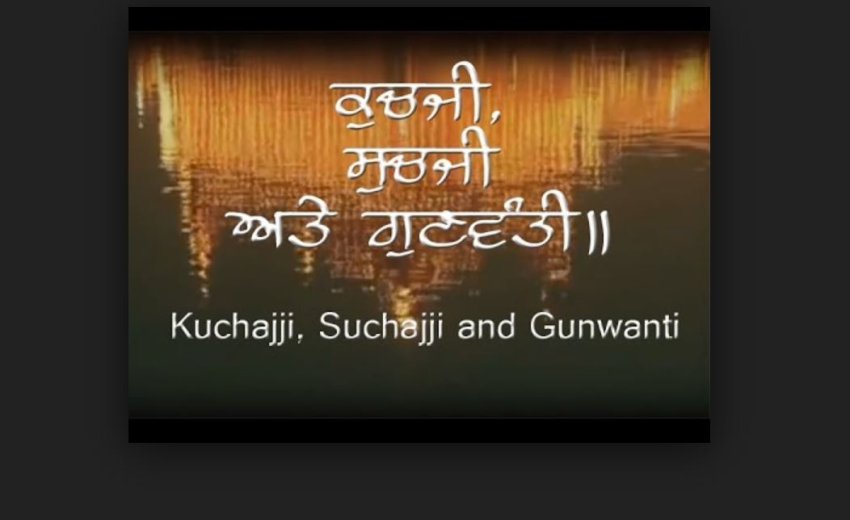Most of us dish out advice to others, but we ourselves often remain clueless on how to lead our lives meaningfully and effectively.
There is, however, no need to despair as Gurbani is filled with wisdom that can help and show us the way.
In this missive, I will be sharing about three beautiful compositions in the Guru Granth Sahib (762-763), entitled as kuchaji, suchaji and gunvanti.
KUCHAJI (pronounced as ku-chajjee), literally, a spoiled woman, is the title of a composition by Guru Nanak in the Guru Granth Sahib. The composition, written in the first person, expresses the emotions of a repentant person who is figuratively called ku-chaji or ill-mannered.
In the Guru Granth Sahib, every human being is a potential bride of the Divine. Here the repentant bride, reflecting on her faults, is questioning how she can enjoy a union with the Divine, which other virtuous beings are sharing with Him.
Who is a kuchaji? How do we define one who is ill-mannered? What are their faults?
A lack of virtues is considered to be one fault. Awareness of the attributes and virtues of the Divine can be the starting point to bring us closer to Him. The wisdom of the Gurus points these virtues out to us. We are just not paying enough attention.
The lure of material possessions in this world is another. We are captivated by the material gifts we have received from the Divine. The wealth, the desire for more creature comforts blinds us to the need to know, to understand and to practice His virtues. Instead of bringing us closer to Him, we are drawn further away by these gifts even though they are from Him. Fooled by focusing on these gifts, we have strayed from the Divine.
Forgetting the reason why we have been given this human life is one more. We have forgotten what this life - this journey - is for. It is as if we are sleepwalking. Being separated from the Divine is painful.
Hence the plea - how can I enjoy a union with the Divine?
Notes: Ku-chaji is said to have been addressed to a sorceress named Noorshah of Kamrup district, in Assam, India, who used to entice men by her 'magical' powers. However, the content doesn't seem to support the conjecture.
SUCHAJI (pronounced as su-chajjee) is the title of another composition by Guru Nanak, in Raag Suhi, in the Guru Granth Sahib.
Suchaji literally means a woman of good manners and accomplishment. Figuratively, this word is used to illustrate the qualities of a Guru-oriented person - a devotee.
The composition throws light on the qualities of such a devotee. She recognizes the Divine dwelling within her. The Divine is all pervading. She accepts that He is her master, her wealth, her everything. He is the provider in her life.
He has the power to place a person on a throne or turn into a beggar. By His will one can sink and drown in the sensual pleasures of the world or one can be saved by Him opening a door to His virtues.
Guru Nanak says that true love of the Divine consists in living in accordance with His will. While doing so, one must not stray from the virtues the Gurus keep teaching us about. The true devotee remains steady and stable in her love for Him, no matter the circumstances around her. She abides by the will of the Almighty.
As potential devotees or suchajis, we also need to be mindful that all that happens in our lives is by the will of the Divine. Our aim, therefore, should be to accept the ups and downs of our life - His will - graciously. We need to be humble and desire only to be close to the Divine.
Through the wisdom and teachings of the Guru, we can find our way to a closer relationship with our Master.
Notes: According to Janam Sakhi tradition, Guru Nanak uttered this hymn in conversation with Shaikh Brahm or Ibrahim, a distant spiritual successor of Shaikh Farid, whom he met in the course of his journey through western Punjab. The Shaikh had said that they who truly loved the Divine were the true ones. Guru Nanak elaborates and says that true love of the Divine consists in living in accordance with His will.
GUNVANTI (pronounced as gun-vantee), literally meaning a woman of good qualities, is the title of a composition by Guru Arjan, in Raag Suhi, in the Guru Granth Sahib. It follows Guru Nanak's Kuchaji and Suchaji.
The term is figuratively used for a Sikh of the Guru or a meritorious devotee. Like the above compositions of Guru Nanak, this one too is uttered in the first person, and by implication, it sums up qualities of a true and pious seeker.
A true and pious seeker yearns to unite with the Divine. In humility, she begs for this opportunity. She asks for an understanding that will allow her mind to be focused on the One Master and not go wandering. She asks that she be shown the path to the Divine.
In the company of those who tread the path of the Guru and through the understanding of and submission to the teachings of the Guru, she hopes the pain of being separated from the Divine is lessened. The Guru tells us to do the work that is necessary to reach this end. One needs to control the mind, rejecting its arrogance.
Too intellectual a mind asks too many questions. One needs to lead it away from temptation and cravings to a place where it can dedicate itself to the Divine. Through its humility and devotion, the love of the Divine is obtained.
Are we willing to become such a virtuous bride or seeker?
The article has been extracted from an issue of AWAT yet to be published. Those who wish to receive the Gems of Gurbani from AWAT can register here: http://awordathought.com/
Compiled and edited by
Ravin Kaur
Australia
Note: The Shabads/Verses are in part. Refer here for the complete ones.






